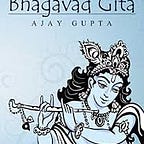Why Is Bhagavad Gita The Final Authority On All Spiritual Matters?
Bhagavad Gita states that a wise human being should know what actions are good and beneficial; and what actions are forbidden.
Bhagavad Gita Chapter 16 verse 24 states the following:
Lord Sri Krishna said:
Therefore, let this scripture be your sole authoritative guide to determine what actions should be performed, and what actions should be avoided. Having known what is stated in the scriptures; one should then act and perform one’s work in the world. (Book: Word of God Bhagavad Gita: Chapter 16 verse 24)
तस्माच्छास्त्रं प्रमाणं ते कार्याकार्यव्यवस्थितौ।
ज्ञात्वा शास्त्रविधानोक्तं कर्म कर्तुमिहार्हसि।। (16:24)
The teaching of Bhagavad Gita is considered as the final authority on all spiritual matters and for to this reason, before giving any testimony in Indian courts, one has to take oath by placing one’s hand on Gita book, and testify that what he or she is going to tell is ‘Truth’ only and nothing else.
Similarly in Sikh religion, ‘Sri Guru Granth Sahib’ is the final authority and ‘Spiritual Guru’ for the Sikhs.
Sri Guru Granth Sahib is the central religious text of Sikhism, considered by the Sikhs to be the final and the Sovereign Guru after the lineage of 10 Sikh Gurus.
It is essentially derived from the teachings of different incarnations of Lord Vishnu and the Vedas, and it echoes the teachings of Bhagavad Gita.
History tells us that there have been several massacres and wars on account of different religions between different communities. There has been massive bloodshed to convert minority religions, by the ruling emperors of those times.
There was an extremely important event in the Sikh history that had a profound impact as a unifying force, and emergence of Sikh religion as a strong community.
Dr. Hari Ram Gupta, an eminent Sikh historian, writes in the ‘History of the Sikhs’: “Emperor Aurangzeb was a barbaric ruler of the Mughal Dynasty who came to power in India in 1658 and ruled for 49 years until his death in 1707.
When he came to power in 1658, he forcibly converted millions of Hindus and Sikhs to Islam.
If anyone refused, then he or she was mercilessly killed. Great atrocities were committed to wipe out the ‘Hindu’ and ‘Sikh’ population.”
“In the year 1675, ‘Guru Tegh Bahadur’ and his loyal devotees were brought to Delhi and asked to convert to Islam or else face death. The Guru was asked to give up his faith and religion. Under Aurangzeb’s orders, Guru Tegh Bahadur and his close followers were imprisoned in a cage and they were tortured to break their ‘will power.’
In order to terrorise Guru Tegh Bahadur into submission, one of his loyal devotee Bhai Mati Das was sawn alive, while another disciple Bhai Dyal Das was put in a cauldron filled with boiling oil and charred to death. A third disciple Bhai Sati Das was roasted alive before the Guru.”
Guru Tegh Bahadur was then publicly beheaded in 1675 on the orders of Muslim Emperor Aurangzeb in Delhi for refusing to convert to Islam and resisting the forced conversions of Hindus in Kashmir to Islam.
Gurudwara ‘Sis Ganj Sahib’ in Delhi now stands majestically, to mark the place of beheading of the Guru, and another Gurudwara by the name of ‘Rakab Ganj Sahib’ in Delhi, marks the place of cremation of the Guru’s body.
In the modern times we take it for granted to follow any religion of our choice — — but in 1675, millions of people were denied this basic human right.
There were forced conversion of religion, and millions of Hindus and Sikhs were killed for refusing to change their religion.
Sikhism primarily is a branch of Hinduism. Sikh religion was formed to oppose the atrocities and killings of minority communities by the Muslim Mughal rulers of that time.
Sri Guru Nanak Dev Ji (1469–1539), the founder of Sikh religion was born in a Hindu family at Nankana Sahib near Lahore (now Pakistan). He studied both the Hindu and Muslim scriptures.
He abolished idol worship and rituals practiced by the Hindus, and formed a new religion which has fundamental roots in Hinduism. Sikh religion believes in one Spirit of God (Ek Onkar) or Wahe Guru.
Sikh religion is primarily based on the path of devotion and Bhakti, to glorify the Spirit of God as the almighty and omnipresent one Spirit of God.
The tenth Sikh Guru, Sri Gobind Singh affirmed the sacred text of ‘Sri Guru Granth Sahib’ as his successor and the final Guru, as after him there was no further lineage of Gurus.
The three duties of Sikhs are Naam Japna (mindful of God’s name at all times), Kirat Karni (earning honest living) and Vand Chhakna (sharing one’s earning with others).
In Sikhism, there are five thieves or five major weaknesses of human beings. These are known as “thieves” because they steal a person’s common sense and intellect.
These five thieves are: kaam (lust), krodh (rage), lobh (greed), Moha (attachment) and ahankar (conceit-ego).
Bhagavad Gita verses also emphasizes that a human being has to overcome and go beyond lust, anger, greed, attachment and ego for Self-realization.
Gita says that God can be realized in both the aspects as in manifest form (as in idols or pictures), as well as unmanifest absolute spirit (unseen without any form). Gita also condemns practice of empty rituals and superstitions.
It can therefore be stated that both Hinduism and Sikhism, echo the same tenets.
Ajay Gupta is a former Naval officer who served onboard Indian Naval warships and aircraft. — He is the author of two books ‘Word of God Bhagavad Gita’ and ‘Want to Know God: For Young and Old.’
Copyright © Ajay Gupta — Reference books: Amazon: Ajay Gupta: Amazon.in: Kindle Store : Word of God Bhagavad Gita by Ajay Gupta:https://www.youtube.com/watch?v=mPz2xKxaS_o
